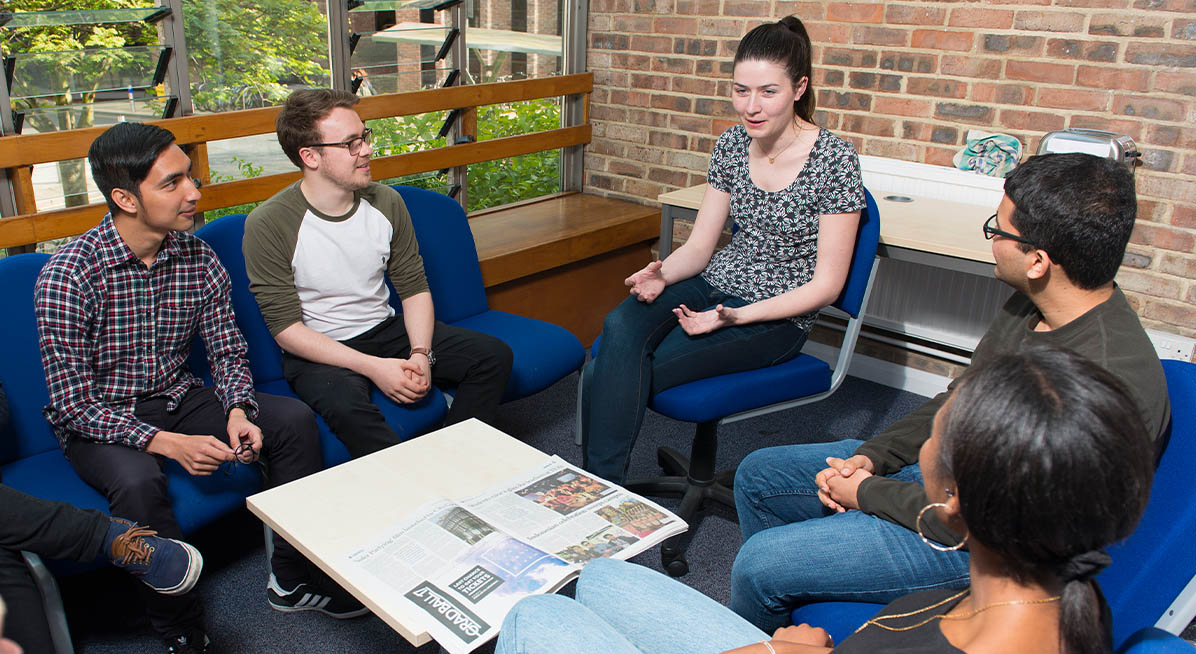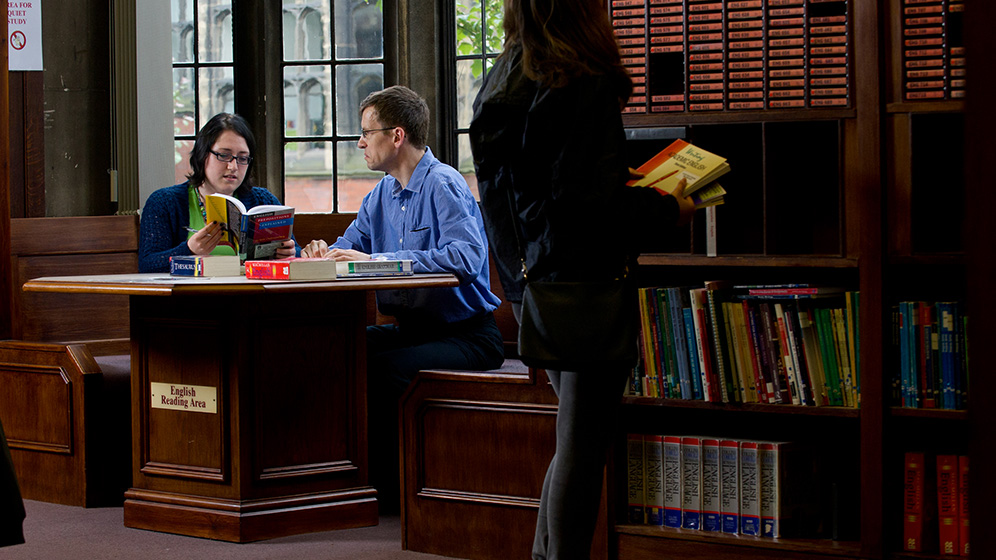Politics and Sociology BA Honours
- UCAS code: LL32
- Full time
- 3 years
Master the art and science of identifying, evaluating and harnessing the political and social forces that shape our lives.
You are currently viewing course information for entry year: 2026
Next start date:
- September 2026
UCAS Institution name and code:
- NEWC / N21
Course overview
During this three-year degree, you will divide your time equally between politics and sociology – acquiring a rich theoretical understanding of both disciplines and a set of practical skills valued by employers.
The course features regular fieldwork and hands-on workshops to ensure that you graduate as a practising sociologist and political scientist. You'll be trained to conduct surveys, evaluate statistics, and use SPSS – the professional-standard data analysis software.
With a wide choice of modules throughout, you can tailor your degree to your interests – whether it's the sociology of crime or race, or the politics of the UK parliament, international diplomacy or the far-right in Europe.

Your course and study experience - disclaimers and terms and conditions
Please rest assured we make all reasonable efforts to provide you with the programmes, services and facilities described. However, it may be necessary to make changes due to significant disruption, for example in response to Covid-19.
View our Academic experience page, which gives information about your Newcastle University study experience for the academic year 2025-26.
See our terms and conditions and student complaints information, which gives details of circumstances that may lead to changes to programmes, modules or University services.
Quality and ranking
Professional accreditation and recognition
All professional accreditations are reviewed regularly by their professional body.
Modules and learning
Modules
The information below is intended to provide an example of what you will study.
Most degrees are divided into stages. Each stage lasts for one academic year, and you'll complete modules totalling 120 credits by the end of each stage.
Our teaching is informed by research. Course content may change periodically to reflect developments in the discipline, the requirements of external bodies and partners, and student feedback.
Featured module
SOC3047 : Critical Approaches to Policing and SecurityExplore policing and security from a critical interdisciplinary perspective. Combine insights from anthropology, sociology, geography and history and engage with current and historical discussions on discourses, practices, and institutions of security and policing.

Optional module availability
Student demand for optional modules may affect availability.
Full details of the modules on offer will be published through the Programme Regulations and Specifications ahead of each academic year. This usually happens in May.
To find out more please see our terms and conditions
You will take a small number of core modules, learning how political and social forces interact, and acquiring some of the skills you will need in your studies.
You will then pick a larger number of modules, half in sociology and half in politics, covering subjects such as epistemology and social imagination, the foundations of modern political thought, Refugees and Displacement, Environment and Ethics, Hope and Despair, Health and Illness.
Modules
| Compulsory Modules | Credits |
|---|---|
| Power and Inequality: How to Study Global Politics ... and Change the World | 20 |
| Politics and Society | 20 |
You will take at least one compulsory training module on sociological research methods, or more if you plan to write a sociology dissertation in Stage 3.
You will also choose a balanced blend of politics and sociology modules, on topics such as political violence, the politics of the Middle East, and identity in multicultural Britain.
Modules
| Compulsory Modules | Credits |
|---|---|
| Researching Social Life | 20 |
You will choose an equal number of politics and sociology modules, plus a dissertation that counts for double. This involves writing a 10,000-word report based on your own research or conducting a team research project with a local community organisation.
Modules
Compulsory modules
Modules
We base these figures and graphs on the most up-to-date information available to us. They are based on the modules chosen by our students in 2024-25.
Teaching time is made up of:
- scheduled learning and teaching activities. These are timetabled activities with a member of staff present.
- structured guided learning. These are activities developed by staff to support engagement with module learning. Students or groups of students undertake these activities without direct staff participation or supervision
Teaching and assessment
Teaching methods
Your work is divided between lectures and seminars, with around 10 hours a week devoted to large and small group study. You will supplement this with a maximum of 28 hours’ private study.
Assessment methods
You'll be assessed through a combination of:
-
Dissertation or research project
-
Dossier
-
Essays
-
Examinations – practical or online
-
Presentations
-
Projects
Skills and experience
Practical skills
You will be trained to conduct interviews, evaluate surveys and statistics. You'll get training in SPSS software, a world-leading statistical software that helps you to understand data, analyse trends, and make informed recommendations.
Business skills
To approach your plans beyond university with real focus, know-how and experience, you can choose to take our career development module in Stage 2.
You will also be able to put your learning into practice further by conducting real-world political research for a local organisation in Stage 3.
Research skills
You will receive practical training in the qualitative and quantitative methods used for political and sociological research, such as designing questionnaires, conducting interviews and analysing data.
You will then conduct your own original research to produce a dissertation, or join a policy research group to address a real-life local issue.
Opportunities
Work placement
Get career ready with a work placement and leave as a confident professional in your field. You can apply to spend 9 to 12 months working in any organisation in the world, and receive University support from our dedicated team to secure your dream placement. Work placements take place between stages 2 and 3.
You'll gain first-hand experience of working in the sector, putting your learning into practice and developing your professional expertise.
If you choose to take a work placement, it will extend your degree by a year, and your degree title will show you have achieved the placement year. A work placement is not available if you're spending a year studying abroad. Placements are subject to availability.
Find out more about work placements
Study abroad
Experience life in another country by choosing to study abroad as part of your degree. You’ll be encouraged to embrace fun and challenging experiences, make connections with new communities and graduate as a globally aware professional, ready for your future.
You may choose to spend either one or two semesters on an international exchange at a partner institution. The exchange usually takes place at Stage 3 with either the first semester (September to January) or the full year being the period of the exchange.
Facilities and environment
Facilities
You'll be based in the School of Geography, Politics and Sociology's Henry Daysh Building.
Support
You will have one-to-one academic and pastoral support from a personal tutor and from a student.
A tutor in the department has twice won a student-nominated award for pastoral care in recent years.
Your future
The nature of the course makes our graduates a good fit for roles in the Civil Service, social welfare, education, human resources, politics, customer services and other roles that require an understanding of political and social mechanisms and an informed interest in other people.
You'll graduate trained to think critically and strategically, and equipped with the skills and knowledge to pursue a range of careers.
Read what our graduates have to say about studying Politics and Sociology at Newcastle University
Make a difference
Sorry, you need JavaScript to view this video
Careers support
Our Careers Service is one of the largest and best in the country, and we have strong links with employers. We provide an extensive range of opportunities to all students through our ncl+ initiative.
Visit our Careers Service website
Recognition of professional qualifications outside of the UK
If you’re studying an accredited degree and thinking about working in Europe after you graduate, the best place to find current information is the UK Government’s guidance on recognition of UK professional qualifications in EU member states. This official resource explains whether your profession is regulated in another country, what steps you need to take, and which organisation you should contact.
Entry requirements
All candidates are considered on an individual basis and we accept a broad range of qualifications.
The entrance requirements and offers below apply to 2026 entry.
| A-Level | |
|---|---|
| International Baccalaureate | |
|---|---|
Other UK and the Republic of Ireland qualifications
Alternative offers at Newcastle
Through one of our contextual or alternative offer routes, you could receive an offer of up to three grades lower than the typical requirements.
Contextual offers
We use certain contextual data from your UCAS form, alongside your application, to consider challenges that you may have faced in your education and the potential effect this may have had on your qualifications. This means you may be eligible to receive a lower contextual offer.
PARTNERS offers
One of the largest and longest support entry routes to university of its kind for students from underrepresented backgrounds. We support applicants from application through to study.
Realising Opportunities offers
A unique programme delivered in collaboration with 10 leading, research-intensive universities in the UK. The programme is open to students in Year 12/first year of college.
Pathways to Newcastle offers
Pathways to Newcastle, our national skills entry route, is available for specific subject areas.
High Performance Athletes
We support promising athletes at the application stage, who compete in regional, national or international levels in their sport.
Qualifications from outside the UK
English Language requirements
Entrance courses (INTO)
International Pathway courses are specialist programmes designed for international students who want to study in the UK. We provide a range of study options for international students in partnership with INTO.
These courses are specifically designed for international students who want to study in the UK and progress onto one of our undergraduate degrees. Our International Study Centre, has a range of study options including:
- International Foundation
- International Year One
- English Language courses
Find out more about International Pathway courses
Admissions policy
This policy applies to all undergraduate and postgraduate admissions at Newcastle University. It is intended to provide information about our admissions policies and procedures to applicants and potential applicants, to their advisors and family members, and to staff of the University.
University Admissions Policy and related policies and procedures
Credit transfer and Recognition of Prior Learning
Recognition of Prior Learning (RPL) can allow you to convert existing relevant university-level knowledge, skills and experience into credits towards a qualification. Find out more about the RPL policy which may apply to this course.
Tuition fees and scholarships
Tuition fees for academic year 2026-2027
The 2026 entry home fees have not yet been confirmed.
| Qualification: BA Honours | |
|---|---|
|
Home students full time 3 years |
Tuition fees (Year 1)
Not set |
|
International students full time 3 years |
Tuition fees (Year 1)
24,500 |
Year abroad and additional costs
For programmes where you can spend a year on a work placement or studying abroad, you will receive a significant fee reduction for that year.
Some of our degrees involve additional costs which are not covered by your tuition fees.
Scholarships
Find out more about:
Open days and events
You'll have a number of opportunities to meet us throughout the year at our on-campus and virtual open days.
You'll be able to:
- explore our beautiful campus
- find out about our vibrant city
- discover what students think about studying at Newcastle
You'll also have the opportunity to speak to academic staff and find out more about the subjects you're interested in.
Find out about how you can visit Newcastle in person and virtually.
We regularly travel overseas to meet with students interested in studying at Newcastle University. Visit our events calendar to find out when we're visiting your region.
How to apply
Apply through UCAS
To apply for undergraduate study at Newcastle University, you must use the online application system managed by the Universities and Colleges Admissions Service (UCAS). All UK schools and colleges, and a small number of EU and international establishments, are registered with UCAS. You will need:
- the UCAS name and institution codes for Newcastle University (NEWC/N21)
- the UCAS code for the course you want to apply for
- the UCAS 'buzzword' for your school or college
If you are applying independently, or are applying from a school or college which is not registered to manage applications, you will still use the Apply system. You will not need a buzzword.
Apply through UCASApply through an agent
International students often apply to us through an agent. Have a look at our recommended agents and get in touch with them.
Get in touch
By phone
Call us on +44 (0) 191 208 3333 and press option 1. Our opening hours are Monday to Friday 10am until 4pm.
Live chat
Our NCL chatbot might be able to give you an answer straight away. If not, it’ll direct you to someone who can help.
You'll find our NCL chatbot in the bottom right of this page.
Online
Keep updated
We regularly send email updates and extra information about the University.
Receive regular updates by email







